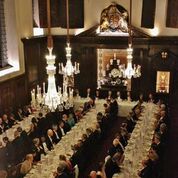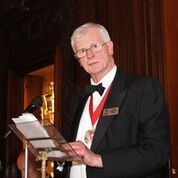Sir Anthony Cleaver's speech at the Installation Dinner of The Worshipful Company of Management Consultants..
 The highlight of our livery year is preceded by a special ceremony of two halves: this year the outgoing Master, Patrick Chapman, installed the Master-elect, David Peregrine-Jones, who then installed the Wardens and the Court Assistants.
The highlight of our livery year is preceded by a special ceremony of two halves: this year the outgoing Master, Patrick Chapman, installed the Master-elect, David Peregrine-Jones, who then installed the Wardens and the Court Assistants. 
David Peregrine-Jones had invited Sir Anthony Cleaver (a former colleague from IBM) to be the Guest of Honour. Sir Anthony is a former CEO and Chairman of IBM UK; Chair of the UK Atomic Energy Authority; the UK Nuclear Decommissioning Authority and the Medical Research Council. Most recently he was Master of the Worshipful Company of Musicians.
.jpg)
Master, Wardens, Members of the Company, Honoured Guests, Ladies and Gentlemen,
If, some 2,500 years ago, you had travelled to consult the oracle at Delphi – in today’s terms rather like seeking a ruling from the United Nations Security Council but delivered by Mystic Meg – on the arch above the entrance you would have seen one of the sayings of the Seven Sages. Three of them we know ; - [the Greek equivalent of…] “nothing too much”, “know yourself “ and “don’t bank on the future” . All three seem to me equally good advice today.
“Nothing too much” is surely right for a speaker - and I promise to bear it in mind. ...
“Know yourself” is also apposite, though I suspect that to know your audience is even more important. And here I have a difficulty. What is the collective noun for management consultants? I wondered about this because I recently came back from a safari in Botswana where I discovered that there are officially agreed collective nouns for almost every animal. Some are perhaps obvious, for example a Dazzle of Zebras or a Tower of Giraffes but how about an Implausibility of Wildebeest? Perhaps you would prefer to share your name with the Apes, who are a “Shrewdness” or more neutrally with the Cheetah who form a “Coalition”. Google’s list of some 200 collective nouns does not include management consultants, while my management team only came up with a miscalculation or a misconception, so perhaps I had better move on....
But for us today by far the most important of the three sayings is “don’t bank on the future”. The last century has seen the greatest period of change in the history of mankind and in many areas the pace is still accelerating. At a purely personal level, for example, the two industries in which I have spent most of my working life, information technology and nuclear power, did not even exist when I was born. And when the Master and I worked together there was neither email or mobile phones, let alone the internet.
Some of you may have seen the television coverage of the Royal Research Ship Discovery, which we sailed up the Thames to Tower Bridge last week as part of the celebration of the 50th Anniversary of the Natural Environment Research Council. If that title was deemed appropriate in 1965 it is much less so today. As the Chief Executive likes to point out, there is virtually no truly natural environment left – the challenge is how best to manage the planet man has transformed.
Management is your concern so what could you bring to the party?
I suggest just what you bring to your normal assignments – a rigorous life cycle assessment based on the best available data leading to a practical action plan. All of which have been frequently absent in the 30 years since I first became seriously concerned with the environment.
Ironically, the first major issue in which I was involved was one of the few unquestionable successes. As the European member of IBM’s Global Environment Council, I was part of the team charged with determining how to eliminate the use of CFCs in our manufacturing plants following the discovery of the hole in the ozone layer – a discovery first made by NERC scientists incidentally. The subsequent worldwide ban had the desired effect and the hole is now closing.
Sadly we have seen far too many botched reactions to problems, usually driven by well-intentioned extremists who have formed a view based on inadequate data, poor analysis and failure to think far enough ahead. An early example was the Brent Spar affair but two situations arising just this year show that we have still not learned the lessons. The first is the bonfire of the environmental subsidies following the election. Not that this is wrong in itself but rather that looking farther ahead and understanding the dramatic improvements in the technologies behind solar power, for example, would have led us to set up a more flexible system in the first place. But even more dramatic is the failure, in the furore over Volkswagen’s falsification of test results, to appreciate that the impact on our air quality of this action is nothing compared to the damage done by the promotion of diesel over petrol in the nineties. Concentrating solely on CO2 emissions led to the introduction of tax breaks to promote the use of diesel – a decision that is a major contributor to the 29,000 premature deaths caused by air pollution in this country every year.
But why do I believe that you have a unique opportunity in this area? Simply because in your normal role you will usually have access to business leaders and many of the key issues and opportunities can only be addressed from that level. While we have come a long way since I called on Marjorie Scardino when I was setting up Business in the Environment - to be told that “Pearsons has no impact on the environment”, there has been far more talk than action. And it is business that must lead, for two reasons. First because the bottom line provides a practical measure for the actions that are taken. Even if we took only those actions that are profitable within, say, a two or three year period, we could make huge progress. And secondly, business must continue to give a lead to the other elements of our society – Government and the individual citizen. Sadly the activities of the Green extremists, with their unfounded claims and impractical demands, have confused far too many people, so that MP’s are not under any great pressure to handle this subject consistently. We desperately need to decide what each element in society really wants and how to meet those desires practically.
Of course one must still be careful what one wishes for – a point perhaps best illustrated by the young woman crossing the concourse at Charing Cross who heard a violin being played very beautifully. Approaching the violinist, she put a ten pound note in his cap and said “Thank you so much – I thought that was magical.”
‘’Well”, he said, “I am a magician and for your generosity I would like to give you three wishes. The only proviso is that whatever you receive, your husband will receive ten times over.” “Well”, she said, “I would like to be beautiful.” “And so you shall and your husband will be among the handsomest in the land.” “And then, I would like to be rich”. “And so you shall and your husband will be one of the wealthiest in the country.” “And then,” she said, and a small smile played around her lips, “and then I should like a very mild heart attack”.
.jpg)
[WCoMC Choir: Visible - Drewe Lacey; Julie Fox; Richard Stewart]
Ladies and Gentlemen, I don’t think we could have wished for better food, wine and hospitality than we have enjoyed in this splendid hall this evening. So now could I ask the guests to rise and join me in a toast to the Worshipful Company of Management Consultants, coupled with the name of the Master….
A toast to the Master, David Peregrine-Jones and Mistress Caroline ....
.jpg)